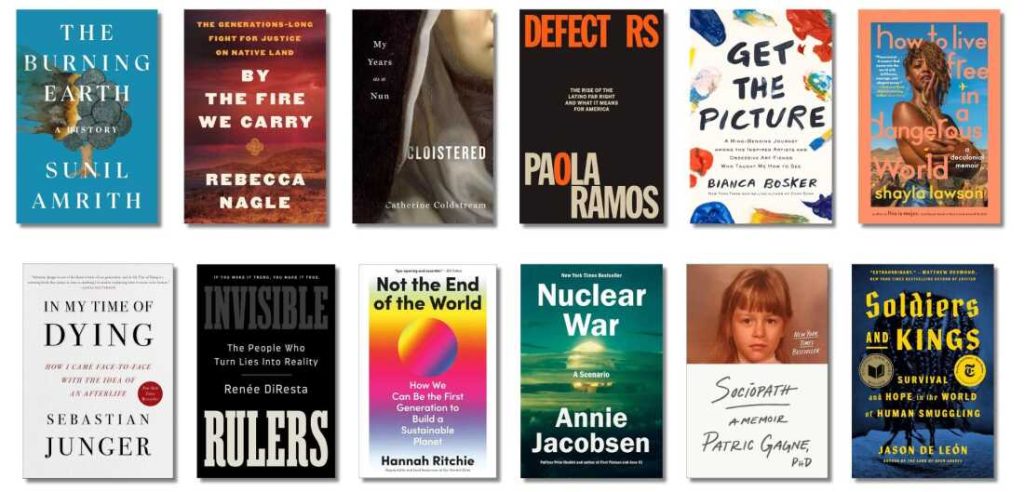Top 10 Must-Read Books of 2025
As the year rolls on, readers everywhere are being treated to powerful stories, provocative ideas, and unforgettable characters. Whether you love fiction that pushes boundaries, memoirs that illuminate new perspectives, or novels that simply sweep you away, 2025 has something for you. Here are ten books you don’t want to miss.

1. Katabasis by R. F. Kuang
A fantasy novel with a sharp edge, Katabasis sends two doctoral students into hell to rescue their thesis advisor. It’s grim, it’s philosophical, and it interrogates academia and the weight of expectation. Kuang is already known for tense, layered narratives; this delivers both spectacle and deep character work.
2. The Hallmarked Man by Robert Galbraith (J. K. Rowling)
The eighth installment in the Cormoran Strike series, this novel serves up murder, mystery, and intrigue—complete with a twisty plot involving Freemasonry and trafficking. Longtime fans will enjoy returning to Strike & Ellacott, while new readers will find enough suspense and drama to get hooked.
3. Vera, or Faith by Gary Shteyngart
Set in a dystopian near-future United States, this is a coming-of-age story through the eyes of ten-year-old Vera, a Korean-American girl navigating growing authoritarianism and her own family’s challenges. It’s absurd, it’s heartbreaking, and it’s deeply human. Shteyngart’s comedic sensibility makes the story entertaining even amid darker themes.
4. The Sunflower Boys by Sam Wachman
A lyrical debut weaving together war, identity, grief, and love. Twelve-year-old Artem’s family is torn apart by the war in Ukraine; the novel follows his journey—physical and emotional—across displacement, loss, and the struggle to keep hope alive. It’s raw and tender.
5. Seascraper by Benjamin Wood
A quieter book, with an atmospheric cast. Thomas Flett and his mother eke out a living by the sea—trawling, selling shrimp, dreaming. Seascraper is an immersive portrait of labor, rural life, and the pull between dreams and necessity. If you want something contemplative, this is it.
6. Accidental Tyrant: The Life of Kim Il-sung by Fyodor Tertitskiy
For readers who love history, biography, and the stories behind power: this book re-examines how Kim Il-sung rose to lead North Korea—not just by design, but shaped heavily by chance, contingency, and complex external forces. It’s well researched and offers fresh insight into a figure many think they already “know.” Wikipedia
7. There Will Ever Be Another You? by Patricia Lockwood
While not always pure novel, Lockwood’s voice—sharp, poetic, immediate—is one to watch in 2025. Her works engage with identity, memory, loss, and longing in ways that feel both universal and deeply personal. Worth reading just to experience her craft. Literary Hub
8. Mother Mary Comes to Me by Arundhati Roy
From the upcoming releases anticipated in Fall 2025, Roy’s work is being eagerly awaited. Known for her lyrical prose, political awareness, and ability to make large issues intimate, this book is expected to deliver powerfully on those fronts. If you follow literary fiction that challenges and inspires, this one’s likely to be huge.
9. What We Can Know by Ian McEwan
One of McEwan’s more philosophically ambitious works, What We Can Know is lauded in many Fall 2025 “must-read” lists. Expect elegant prose, deep questioning, and moral complexities. For those who like thinking along with their reading, this is a good choice.
10. The Impossible Fortune by Richard Osman
If you prefer something lighter, fun, but still clever, Osman delivers. The newest entry in the kind of cosy mystery / detective genre with whimsical characters, unexpected twists, and warmth. A pleasure to read when you want something engaging without being too heavy.
Why These Books Matter
Diversity of voices & styles: These books span genres (fantasy, historical fiction, dystopia, memoir, investigative biography), international settings, and fresh perspectives.
Balance of entertainment & depth: Many offer suspense, plot, or imaginative worlds, and also push readers to think about bigger issues — identity, power, trauma, morality.
Emerging & established authors: You get new voices (Wachman, Wood) alongside masters (McEwan, Roy, Kuang). It’s a snapshot of literature evolving.
If I were you, here are a few reading tips for 2025:
Set a theme for a month (e.g. dystopia, memoir, war) so you can explore breadth.
Keep a small notebook for quotes or ideas — many of these works offer sentences you’ll want to revisit.
Join or follow reading groups / podcasts to see how different readers interpret the same book.
